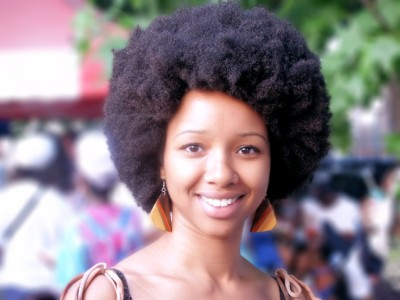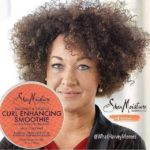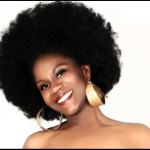In the summer of 2004 I was combing out my hair in preparation to attend the International African Arts Festival. As I rinsed the conditioner out of my thick and tangled nappy hair, I grew excited about the fun I knew we were about to have.
The festival, which takes place in Brooklyn, NY, is a major event. Every year thousands of people of African descent gather there in order to celebrate the arts, dance, family and community. Attending the festival was an annual tradition for my husband and I.
We reveled in the joy of having spaces where we could be surrounded by thousands of Black people who took pride in our history and culture.
That particular year and on that particular day, I was in an afro kind of mood. By that point, I had worn my hair natural for several years and like many Black women, I looked forward to being in environments like these. It was one of the few places where Black women could be as natural as we wanted to be and feel affirmed by those around us. It was one of the rare times of the year when big lips, noses and behinds were the preferred beauty norm. Rather than merely defying a European beauty standard, on these days and at events like the festival, Blackness and Black features were the beauty standard.
As many nappy-headed Black women can attest, there are not many spaces where wearing Black hair in its natural state will be rewarded with public displays of positivity. Because of that, events like the festival were as much encouraging as they were soothing to the soul.
I’d just washed my hair that morning and was stuck between wearing a twisted up-do or fluffing it out into an afro. But the sun was shining and it was going to be a gorgeous day – so I elected to rock the afro. Sometimes, a sista just needs to feel the power that comes from walking around under that big cloud of hair. Those are the days when a woman can revel in the powerful feeling that comes from being fully possessed of herself. I call these moments my “afro state of mind.” A quick smear of lip-gloss and some extra primping in the mirror and a short while later my husband and I headed out to Brooklyn’s Black Mecca.
While we walked through some of the vendor tables I was approached by a beautiful woman who was also wearing an afro and sporting a fancy camera. Her name was Mireille Liong and she was a photographer from Surinam who arrived in Brooklyn by way of the Netherlands. She asked if she could take my picture and I happily obliged.
Now typically, most New Yorkers would shy away from random strangers asking to snap your photo. However, considering how few uplifting pictures there are that display Black women with natural hair – I was excited about the fact that someone out there actually wanted to feature us in that way.
Several years later I received a message from a friend of mine who said she had recently seen my picture at an exhibit featuring Black women with natural hair. The exhibit displayed photos of a variety of Black women with a diverse arrangement of natural styles. One of the photos was the picture taken of me wearing the afro several years earlier at the festival. The picture had received rave reviews and the photographer was trying to locate me.
I reconnected with Mireille and learned that she owned a website, www.going-natural.com which was dedicated to women with natural hair. Its goal was to promote the beauty of Black women who embraced their hair as it came – nappy, beautiful and completely undefined by the traditional European standard of beauty. She mentioned that she and a number of other female business owners who catered to Black women were looking to do a photo shoot to showcase their products and asked me to be one of the models.
Now, at the time, watching Tyra Banks’ America’s Next Top Model was a favorite hobby of mine. So naturally I jumped at the opportunity. Considering the fact that I had never been in a professional photo shoot before – I was excited just to take the pictures.
But I had no idea that those photos would one day lead to so much more. Within a matter of weeks, the pictures were widely circulated across websites dedicated to Black women and natural hair. Their response was overwhelming.
Soon, other blogs and websites began using the images in their articles – which naturally lead to even more exposure. Thanks to the advent of social media, many of the articles and pictures featured on the websites allowed for comments from readers. The responses were overwhelmingly positive. Black women – regardless of how they wore their hair – responded to the pictures and articles in a way that spoke volumes.
As I began reading through the comments, I noted that they that reflected a wide spectrum of thought surrounding the topic of Black hair. While I enjoyed reading the more positive comments, I was sadden by the fact that many expressed sentiments that I’d heard before like:
“She has the face for natural hair so going natural probably wasn’t an issue for her.”
“I would go natural – but only if my hair could look like that.”
“I love her hair on her. But I could never wear my hair to work like that.”
“I would wear my hair natural – but no Black man is ever going to marry a woman with hair like that.”
It was clear from the comments that no matter the texture or one’s political affiliation – as Black women, our hair is vitally central to how we see our selves. It was also clear that we collectively lacked a framework for understanding how our hair – and society’s response to it – shapes who we are as Black women. This blog is designed to contribute to the development of that framework. My hope is that my journey through life as a nappy-headed Black girl will add something more to the conversation.
Sound off in the comments: what have been some of your natural hair experiences? What do you wish people knew about natural hair?





I would say to them that our hair is beautiful and any kind of denouncing of what women are born with is an act of denouncing who they are as human beings. In order to see beauty around them they must first see it in themselves and deprogram their mind-sets. I highlight the beauty of Mother Africa’s descendants all over the world.
I enjoy what you guys tend to be up too. Such clever work and exposure! Keep up the superb works guys I’ve included you guys to blogroll.
Thank you!
I love rockin my hair big and in all it’s glory. But I got the wierdest response from my mom when she asked me whe I was going to straighten my hair. This from someone who themselves used to wear a shoulder width afro! I tolld her I wasn’t and moved on. I love your fro!
LOL at your mom’s question – and at your response! Great way to handle that comment and keep it moving. 😉